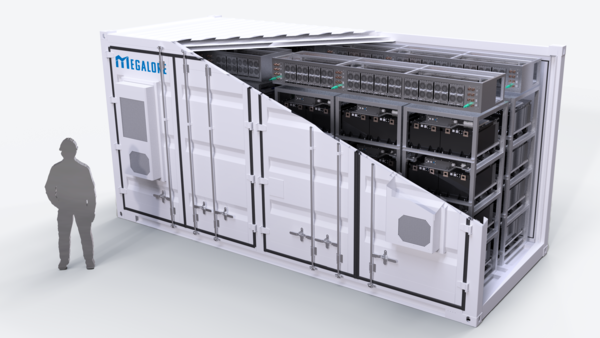THMJ Develops Stationary Power Storage System Reusing Lithium-Ion Batteries for Lift Trucks
—Collaborating with Toyota City to Establish a Circular System and Spread the Use of Storage Batteries—
[Translation]
Toyota Material Handling Japan ("TMHJ"), a division of Toyota Industries Corporation, has developed the MEGALORE power storage system that reuses ENELORE Lithium-Ion Batteries ("LIBs") for electric lift trucks. This system contributes to the construction of a lift truck LIBs circular system and the widespread use of storage batteries by reusing batteries that have reached their replacement age in stationary storage systems, for which demand has been increasing in recent years. In addition, TMHJ is participating in the "FY2023 Demonstration Project for Further Utilization of Distributed Energy Resources (DER Aggregation Demonstration Project)*1" of the Ministry of Economy, Trade and Industry (METI). Under this project, TMHJ will verify the effectiveness of MEGALORE by carrying out a demonstration experiment to stabilize power usage in collaboration with Toyota City, Aichi Prefecture, starting in January 2024 as a first step toward the stable supply of power.
Development Background
The electrification of lift trucks, which are mainly used in limited areas such as inside plants and logistics warehouses, is progressing as it becomes easier to develop charging infrastructure. In particular, demand is growing for vehicles equipped with LIBs that can be charged quickly and have high charge/discharge efficiency. To meet this demand, TMHJ added ENELORE to its product lineup and has been offering it to customers since 2020.
However, one challenge to address going forward is how to utilize ENELORE batteries that have reached their replacement age. Since end-of-life batteries for lift trucks still retain sufficient battery capacity for some applications, TMHJ has focused on stationary power storage systems, which are in growing demand as a means of using renewable energy and other resources. As a result, it began the development of MEGALORE, which reuses ENELORE batteries.
System Features
MEGALORE is a large-capacity stationary power storage system consisting of up to 42 ENELORE batteries loaded into a container. Its total battery capacity is 777 kWh*2, which is equivalent to the amount of power used by approximately 70 households*3 in a day. Lift truck batteries, designed to be replaced, are easy to collect from vehicles, and their rectangular shape allows for efficient loading into containers. In addition, the monitoring functions set in ENELORE batteries for capacity and degradation status will contribute to the stable operation of MEGALORE. Going forward, TMHJ will continue to make improvements based on the findings and issues raised by this demonstration experiment, with the aim of commercialization.
TMHJ will not only develop and sell lift trucks with enhanced environmental performance, but also engage in the reuse of batteries to contribute to the development of a sustainable society that realizes prosperous lifestyles.
| *1: | A demonstration project to precisely control technology, etc. to bundle many renewable energy sources and distributed energy resources |
| *2: | Theoretical value when operated while loaded with 42 ENELORE batteries that have 20% reduced battery capacity; actual battery capacity will vary depending on the remaining capacity of the ENELORE batteries used and the operating environment |
| *3: | Approximate value calculated from the annual power consumption per household in the "Summary of Results of Survey on the Actual Conditions of Carbon Dioxide Emissions from Residential Sector in FY2021 (Final Figures)" by the Ministry of the Environment |
<MEGALORE Overview>
1. Output: 250 kW
2. Total battery capacity: 777 kWh
<Demonstration Experiment Overview>
1. Period: Mid-January 2024 to end of March 2025 (tentative)
2. Location: Toyota Civic Cultural Center (12-100 Kozakacho, Toyota City, Aichi Prefecture 471-0035)
3. Demonstration items:
1) Economic effect of stabilize power use
2) Use as an adjustment power source in the power market
3) Effectiveness as an emergency power source during disasters

